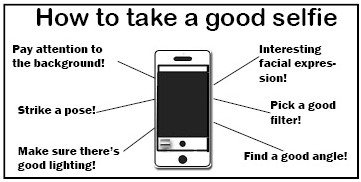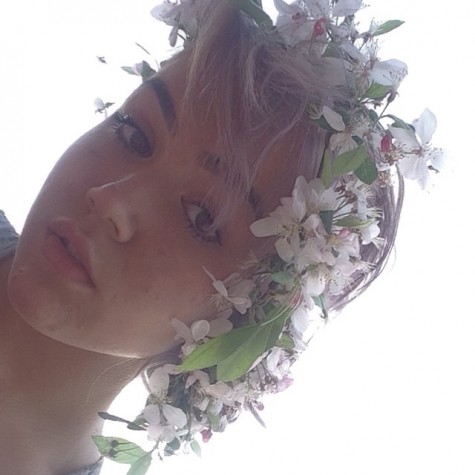Likes are the new compliments
Why selfies are more lucrative than vain

What can a selfie say about us? Some adults, likely growing up in a time of modesty and limited technological communication, say that these photos are a sign of extreme narcissism in Generations Y and Z, kids born in the 90’s and sooner.
But can we think more deeply about selfies and their significance, specifically for teen girls?
Let’s take a step back from the ‘duck-face’ for a moment and look at how these happening headshots weigh in on social and cultural changes. You might find that they’re more important than you think.
We aim our front cameras, brush our hair out of (or into) our face, suck in our cheeks, tilt our head, pout our lips a little, and click.
After a good 10-30 snapshots we carefully sift through our photostream, still editing our decidedly perfect photo with an array of filters and toying with photoshop-like functions now added to Instagram such as saturation or brightness.
All of this is to make us look better because in theory, the better you look, the more ‘likes’ you receive.
Contrary to popular belief, we teenagers do know that ‘likes’ don’t equate to people actually liking us.
The true addiction of likes is the short living pride of seeing those double-taps reach fifty, a hundred, a thousand. You see, selfies aren’t narcissistic, they’re the complete opposite.
On the surface, I see how the collage of faces on Instagram can look self-obsessed; but the truth of the matter is it’s our generation’s display of social status. That’s where we start comparing, and we feel the need to be as desirable or enviable as a girl with a beautiful selfie. In a world where Kylie Jenner’s perfect cheekbones, lush pout, and doe-like eyes at age 16 are more than some of us could ever wish for at 26, young women simply don’t know what to do with ourselves.
The widespread access to photo editing now brings another element to selfies too. Most selfies aren’t just a point and click, which proves that this isn’t true narcissism.
Most selfies are edited, whether it be a quick filter or 10 minutes worth of adjusting brightness and trying to blur out pimples or imperfections.
We can take a time when we know we’re looking our best, or edit ourselves to look better, and throw it out to the Great Interweb. That alone is a testament to the teen spirit.
No matter who you are, there is always tentativeness to clicking ‘post’.
To take the chance for others to compliment our faces online is just as important in this day and age as getting complimented in person was in eras past.
Now we can be complimented without limits, 24/7 and by anyone across the world. This is the limitless and lucrative state of the selfie.
So the next time you see that girl in your English class with her front-camera readily aimed, instead of calling her conceited, go ahead and click ‘like’. It may make all the difference in the world.

